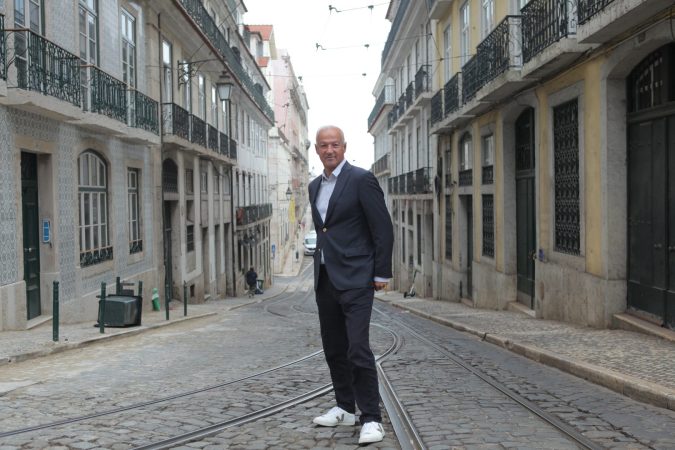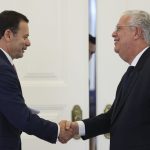The defence and security of Portugal
Portugal must invest more in security, both external and internal. However, more important than increasing defence-spending on weapons are organisation, leadership and motivation, argues Rui Ramos Pinto Coelho, founder and CEO of investment company 6 Graus.
Text: Rui Ramos Pinto Coelho
During the last major financial crisis, when Portugal, Italy, Greece and Spain were derogatorily referred to as PIGS, the Dutch Prime Minister Mark Rutte complained that the Portuguese spent their money on wine and women. Now that he is the Secretary-General of NATO and Portugal, with great effort, has achieved budgetary balance, he has announced that Portugal (and all the other European countries) must spend more money on armaments and defence.
I confess that I enjoy having a drink and that I am, with great pride, from a family known for producing excellent wines. I also like women (I’ve been married for over 24 years). It is therefore natural that I spend some money on wine and women, but nothing that deserves criticism, especially not from a Dutchman, whose country is famous for its red-light districts and liberal drug-selling.
As for armaments, despite having completed mandatory military service, I don’t like them. But given the threat of spending around 5% of GDP on armaments (Donald Trump’s proposal), I took the liberty of thinking about the matter and share here some ideas.
For sure the international situation is threatening. We have a war on the European Union’s border for three years already, where the aggressor regularly threatens to use nuclear weapons (an unprecedented situation) and, to worsen our position, the most powerful country in our military alliance seems to be renouncing the alliance and defending the aggressor’s positions.
Recently we had access to a supposedly private exchange of messages from top USA leaders, including the Vice President, where they clearly say they hate Europe.
Portugal – a refuge in Europe
On the other hand, Portugal is geographically far from Ukraine and is seen as a refuge for people of many nationalities, consistently ranking as one of the safest countries in the world.
Therefore, does it make sense to divert significant resources from critically lacking areas such as Housing, Health, Education and Infrastructure to Defence?
Divestment in defence
Regarding Portugal, our history is filled with wars for the conquest and defence of what we considered to be our territories, against Moors, Castilians, French, Dutch, and many others. The last war occurred on three fronts (Angola, Mozambique, and Guinea) over 13 years, forcing the country to create a large military organisation that was gradually dismantled after peace in 1974.
Being part of NATO, a powerful military alliance led by the USA (the most powerful country in the world), after the fall of the Berlin Wall (1989) and the disintegration of the Soviet Union (our common enemy), the Portuguese leaders felt secure enough to end mandatory military service (decided in 1999 and abolished in 2004, 21 years ago).
From then on, there was no motivation to invest in defence, probably due to the belief that it did not garner votes; that it was not a priority; that our allies guaranteed our security; and that Portugal was friends with everyone. This led to continuous divestment in the armed forces, making the country fail to meet our obligations to NATO of investing 2% of GDP in Defence.
During the 25th of April 2022 celebrations, the President of the Republic sounded the alarm, calling for greater investment in the Armed Forces, saying: “If we do not want to create these conditions, we cannot complain if one day we discover that we are demanding missions that are difficult to fulfill due to lack of resources, because if we do not act in time, others will demand it for us, and then we should not complain about frustrations, disappointments, protests or withdrawals.”
He also added: “Because without (…) strong, united and motivated Armed Forces, our peace, our security, our freedom, our democracy (…) will be weaker.” He was completely ignored by the then Prime Minister António Costa.
Few soldiers – old weapons
In 2017, the theft of ammunition from Tancos military base occurred, one of the most shameful episodes for the Portuguese army, highlighting the miserable state of the military forces, unable to guard their own weapons. The weapons were later recovered.
Six years later, some Portuguese navy soldiers refused to obey orders to escort a Russian ship north of Madeira, claiming the escort ship was not seaworthy.
Understandably, the Chief of Staff of the Navy, Admiral Henrique Gouveia e Melo, classified the refusal as an act of insubordination and punished those responsible, because if soldiers start deciding not to obey orders, the chain of command breaks down and any notion of security crumbles. But the next time that ship went to sea, it indeed broke down.
According to the newspaper Diário de Notícias, defence budget cuts in Portugal have exceeded €3Bn over the last decade, and the result of these cuts was that our Armed Forces have few soldiers and old weapons.
Generally, we identify security against external enemies, secured by the Armed Forces, as Defence, and security against internal enemies by the Police. However, broadly speaking, we can simply speak of security and assume it is undoubtedly one of the main functions of the State that should in no circumstances be privatised or left to third parties.
From the victim’s perspective, the aggressor’s nationality is entirely irrelevant. Thus, security against both internal and external enemies is equally important.
Moreover, war (meaning external aggression) has “evolved”, becoming hybrid, encompassing the economy, cyberattacks, and internal disruptions and disinformation through infiltrated agents. Internal and external security are increasingly interconnected and must be viewed holistically.
We are part of a global world and proud members of a large union of democratic countries – the European Union – and of the most powerful military alliances – NATO. These together were able to ensure peace in Europe for a large period. We should make sure we stick to these alliances and do our part, but never again believe that it is up to other nations to take care of our security.
After these considerations and briefly analysing our armed forces, let’s look at our internal security. Several problems stand out:
Prisons where inmates escape, and drugs and mobile phones enter;
Neighbourhoods where the police do not enter or enter with such fear that they end up making life-or-death mistakes;
Drug dealers harassing everyone in downtown Lisbon, unlike in any other European city… not even in Morocco;
Too many different police organisations, creating confusion and sometimes conflicting with one another.
The police confess their impotence under the laws established by an incompetent parliament, also a victim of its own failings, forced to tolerate a deputy who notoriously stole suitcases at airports (the police caught him on the spot and even have video footage, yet he remained in parliament, voting).
Serious crimes rising in annual national statistics
Political leaders refuse to acknowledge that many crimes are no longer reported to the police, because people have heard the police say time and time again, they can’t do anything… leaving them out of statistics and making Portugal continue to be “one of the safest countries in the world”.
Sure, some of the problems we are facing can be traced to laws and the functioning of the judicial system and not to the police or the armed forces. Again, the security of the country must be seen in a holistic manner.
Recently I saw the remark that it was more important that no misconduct would be left unpunished than having thought laws/penalties, and I agree.
If the people feel criminals are not punished, the feeling of insecurity will rise to levels that will propel the rise of extremist demagogues, and the basis of our society can be put at great risk.
Certainly, a country’s security needs will vary with geo-strategic changes, society and the technological evolution… Years ago, there was no need for digital security, which is now essential; just imagine the insecurity that can be caused by a disruption in our energy grid or banking system.
In conclusion: yes, Portugal must invest more in security, both external and internal. However, much more important than weapons are organisation, leadership and motivation.
We should not, however, buy weapons without first organising existing resources, as this will only get us into debt and contribute to us losing our economic independence and therefore the security we were trying to achieve.
The scarcity of resources, but mainly the lack of organisation and good management, should force us to rethink and organise our security in an integrated manner, across the various areas of the country: land, sea, airspace and digital sphere.
Whether enemies are internal or external is of little importance; they move in these areas and we need to take measures that ensure the safety of our citizens.
Unity of command is required in each of these areas so that the available resources can be correctly organised and to ensure their effective and efficient use. Coordination between these and other areas of management in the country, and with our allies, is also important.
We should pay special attention to the sea because we have two archipelagos, a large exclusive economic zone, and a frontier with the European Union. A good example is the coordination between national police and armed forces with our allies in the fight against drug trafficking at sea, that recently led to the capture of a submarine from a drugs cartel with around seven tons of cocaine. This example of cooperation should be praised and followed across all the security forces.
A clear priority should be given to technology and to human resources that know how to use it because wars are increasingly being fought by machines – namely satellites and drones that are proving to be essential by land, air and sea.
But the main thing is for our people to be prepared to deal with any kind of threat. According to the theory of best-selling author Simon Sinek, and the example he gives about the Vietnam War, we could say the defence (survival) of the independence of our country must be seen by our people as an “infinite game”, one we can never lose if we don’t give up, and ensure everybody knows it. That way we will be invincible, even against very powerful enemies. After all, we have survived for 800 years.
Strange as it might seem to many, money is not the answer, just resources.
Photo credits:
- Tancos Military Base in Portugal – Military personnel of Tancos Military Base, in the center of Portugal, 4 July 2017. On 29 June 2017 the thieves stole anti-tank grenades, plastic explosives and more than 1,400 rounds of ammo from the Tancos military complex. PAULO NOVAIS/LUSA.
- Article author, Rui Ramos Pinto Coelho. Photo: Jorge Amado.











